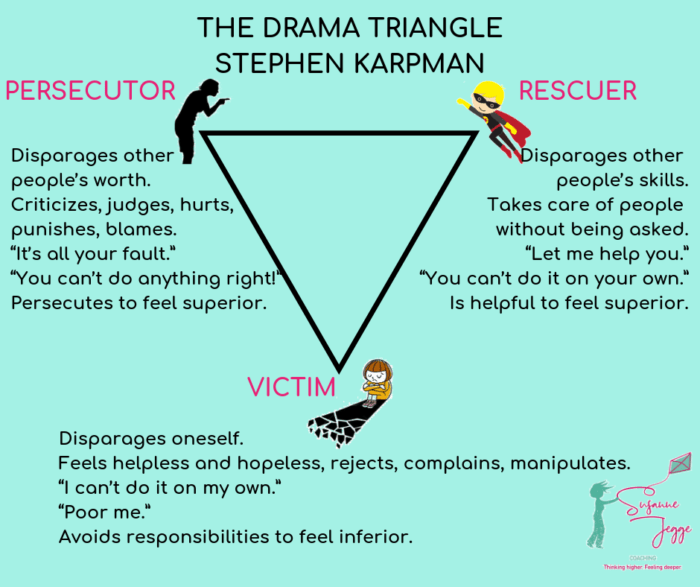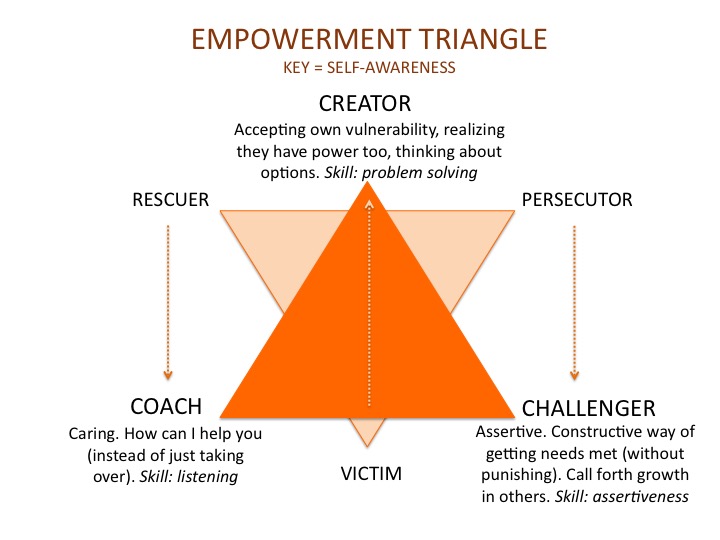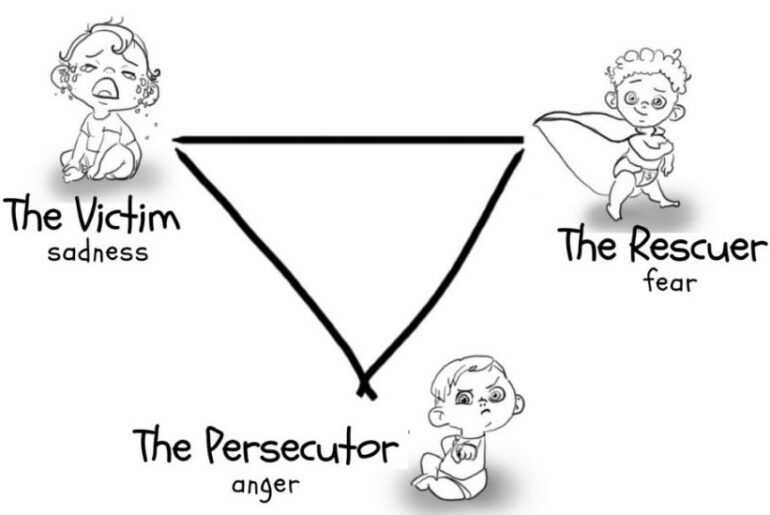Image Courtesy: https://crewcoop.org/en/drama-triangle/
We’ve all been in some sort of drama in our lives, haven’t we? Not necessarily pulling someone’s hair and scratching their face or fist-fighting in the middle of the conference room. But you get the gist, don’t you? At some point, we willingly or unwillingly got into conflict with someone else. It could be a small confrontation once upon a time or a grudge that’s been going on for ages, either way, we’ve been there. However, most often than not, we are unaware of our roles in the whole drama and how we affect our relationships with other people.
A psychologist by the name Stephen Karpman came up with a social model of human interaction, which maps conflicted or intense-dramatic relationships. He called it ‘The Drama Triangle’.
The Drama Triangle consists of three players: The victim, The Rescuer and The Prosecutor.
The Victim: The Victim’s stance is “Poor me!” or “why is this happening to me?” The Victim feels victimized, oppressed, helpless, hopeless, Shameful, Guilty. The Victim sees life as happening to them and feels powerless to change their circumstances. Victims place blame on a Persecutor who can be a person or a situation. Feeling helpless, the victim seeks a rescuer to save them or solve their problems.
The Rescuer:The rescuer’s line is “Let me help you.” The rescuer is an Enabler, Pain reliever, takes the responsibility of others’ problems. They feel guilty when they don’t rescue someone else. He/she keeps the victim dependent on him to always help and save him. The rescuer focuses their energy in helping other people in order to ignore their own anxiety and issues and feel good about themselves.
The Persecutor: The Persecutor insists, “It’s all your fault” or“They’re wrong I’m right. They need to do as I say.” The Persecutor is critical, oppressive, frustrated, angry, critical, controlling, superior, blaming.

We, as human beings, tend to switch around the three different roles in our lives. Sometimes we’re the victims, sometimes we’re the rescuers and sometimes we’re the persecutors. Each one of us has a starting gate, which is the dominant role we play i.e when a conflict arises, there’s the role we automatically take. For example, when a misunderstanding happens at work, you could automatically start blaming the other person for the mistake, which makes you the persecutor. Maybe a little while later, when summoned by your boss to explain the conflict, you turn to be a victim. And in case there was a third party involved who was not at fault, you become a rescuer, you stand up for them and fight for them even when they didn’t ask you to.
Rescuers most of the time have low self-worth and they tend to take part in destructive helping i.e. they do what they don’t want to. They say yes when they mean no and they fix other people’s problems and feelings, sometimes even when not asked. Rescuers typically feel unlovable so they settle for being needed. Caretaking provides them with a temporary hit of good feelings, self-worth, and power. However, caretaking is also martyrdom and people-pleasing behaviour (not healthy AT ALL!).
Sometimes, rescuers use religious beliefs to justify their destructive helping. Religion does encourage us to help people but not at the expense of our own destruction. A rescuer needs to understand that there’s a difference between supporting someone and rescuing them. All that is expected from us is to support people, be there for them without necessarily sacrificing ourselves or our own lives for the sake of other people. Caretaking breeds anger: Unsatisfied, frustrated, confused and this is because ultimately, you will get tired of trying to save everyone. And this frustration and exhaustion is what typically makes one turn to be a prosecutor; you start getting angry that people don’t appreciate you enough and that’s when the cliche lines comes in (when the one helped tells the rescuer): “Did I ask you to do this for me?” Or you feel hurt when people don’t reciprocate the amount of energy you invest in them which could turn you into a victim: “People always mistreat me or under-value me.” It is noted that self-destructive behaviours like chemical abuse, sexual and eating disorders are developed through the victim role.
Now on the flip side, we have ‘The Empowerment Dynamic’ (TED) which is made up of three roles that stand as antidotes to (or escapes from) the Drama Triangle Roles:
1. The Creator: (previous victim): In this case, the victim asks themselves questions like “what creative ways can I deal with this problem?” “what are my goals?” “what is my passion?” They take charge of their own lives and have self-awareness.
2. The Coach: (previous rescuer): In this case, the rescuer is no longer an enabler but a supporter. They listen and hold your hand, they support and they want you to be the best version of yourself.
3. The Challenger: (previous persecutor): In this case, the persecutor asks themself questions like “Don’t you think you’re doing this because you want this?” They challenge you to grow.

How To Save Yourself From The Drama Triangle:
1. Being aware of the toxic patterns: “what am I seeking when I play out the victim/rescuer/persecutor role?” “Am I seeking attention? Do I crave love? Do I yearn for power? Am I trying to hide my insecurities? Am I helping people to run away from my own problems?”
2. Honest communication: Say exactly what you need or seek from the other person or what you’re feeling. e.g. If you feel insecure whenever your husband goes out with his friends during weekends, then tell him you feel insecure and need reassurance. If your wife wants to go on a trip with her friends and you think they’re a bad influence, talk to her about it instead of just trying to sabotage the trip. Save everyone the drama and the conflict. Silent treatment doesn’t do anyone any good. Honest communication goes a VERY long way in building better connections (It can be very difficult to really be vulnerable and speak your heart out, but that’s exactly what is needed for healthier relationships)
3. Say no when you want to say no.
4. Do the things YOU want to do, not to please other people, not to rescue someone, but because you literally want to do the thing.
5. Refuse to guess people’s needs/wants i.e. If someone hasn’t directly asked you for something don’t do it (of course it depends on the situation. If someone is stabbed, please help them without them asking?). Sometimes your intention could be to help yet end up making matters worse or spoon-feeding the victim who should stand up for themselves.
6. Insist that others ask you directly for what they want or need from you. i.e. when someone is telling you their problem, ask them nicely what they need from you or how you can support them (if you are in a position to help that is, if not, don’t kill yourself with guilt over it).
7. Refuse to assume others’ responsibilities. Refuse to rescue and refuse that other people rescue you. At the end of the day, each human being should deal with their own lives. Not unless someone is disabled or mentally challenged, very ill, or very elderly, (even this depends on context), don’t be anyone’s saviour or persecutor. If your child does wrong, let him/her face the consequences of their actions. Saving sometimes leads to more terrible damage than we intended.
I honestly believe we’ve all been here, but some more than others. Accept your mistakes, take charge of your life and work on being better, build better connections and have healthier relationships!
P.S. We see these triangles a lot in soap operas movies and shows, (fairy tales too!) but that is why they are called ‘drama series/shows’. They are NOT healthy and there’s nothing romantic about it! Drama makes a good book, a good show or movie, but it doesn’t make a good life. Let’s please leave those for entertainment only.
***
Thank you for reading! How about you subscribe below too? 😉 Thank you!


